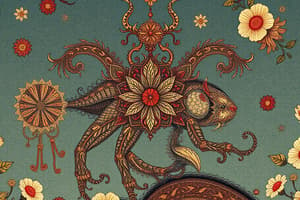Podcast
Questions and Answers
What is Speciation?
What is Speciation?
- The process by which one species splits into two or more species (correct)
- The increase in genetic diversity
- An evolutionary process unrelated to species
- An event that causes species extinction
What is Anagenesis?
What is Anagenesis?
The accumulation of changes that gradually transform a given species with different characteristics.
What is Cladogenesis?
What is Cladogenesis?
The splitting of a gene pool into two or more separate pools, leading to the emergence of one or more new species.
What is the biological species concept?
What is the biological species concept?
What are the differences between prezygotic and postzygotic barriers to reproduction?
What are the differences between prezygotic and postzygotic barriers to reproduction?
What is Habitat Isolation?
What is Habitat Isolation?
What is Temporal Isolation?
What is Temporal Isolation?
What is Behavioral Isolation?
What is Behavioral Isolation?
What is Mechanical Isolation?
What is Mechanical Isolation?
What is Gametic Isolation?
What is Gametic Isolation?
What is Reduced Hybrid Viability?
What is Reduced Hybrid Viability?
What is Reduced Hybrid Fertility?
What is Reduced Hybrid Fertility?
What is Hybrid Breakdown?
What is Hybrid Breakdown?
What is the Morphological Species Concept?
What is the Morphological Species Concept?
What is the Paleontological Species Concept?
What is the Paleontological Species Concept?
What is the Ecological Species Concept?
What is the Ecological Species Concept?
What is the Phylogenetic Species Concept?
What is the Phylogenetic Species Concept?
What is the basis for allopatric speciation?
What is the basis for allopatric speciation?
What does sympatric speciation mean?
What does sympatric speciation mean?
What is Autoploidy?
What is Autoploidy?
What is Alloploidy?
What is Alloploidy?
In what types of organisms is polyploidy speciation more common and why?
In what types of organisms is polyploidy speciation more common and why?
Flashcards are hidden until you start studying
Study Notes
Speciation and Evolution Types
- Speciation is the process of one species splitting into two or more distinct species.
- Anagenesis (phyletic evolution) refers to gradual changes that transform a species over time, leading to new characteristics.
- Cladogenesis (branching evolution) involves the splitting of a gene pool, resulting in increased biodiversity through the emergence of new species.
Biological Species Concept
- Defines a species as a population that can interbreed to produce fertile offspring, while unable to do so with other populations.
- Limitations include asexual organisms, fossil records, and species with unknown reproductive methods.
Reproductive Barriers
- Prezygotic barriers prevent mating or fertilization, while postzygotic barriers stop developing or reproducing organisms after fertilization.
- Habitat Isolation occurs when species rarely meet due to geographical locations.
- Temporal Isolation happens when species breed at different times (day, season, or year).
- Behavioral Isolation includes unique courtship rituals that limit mating chances between species.
- Mechanical Isolation results from morphological differences that prevent successful mating.
- Gametic Isolation involves sperm not being able to fertilize the eggs of a different species.
- Reduced Hybrid Viability indicates that hybrid offspring may not survive due to genetic incompatibilities.
- Reduced Hybrid Fertility means hybrids may be vigorous but sterile.
- Hybrid Breakdown refers to first-generation hybrids being fertile, but subsequent generations being weak or sterile.
Species Concepts
- Morphological Species Concept identifies species based on structural features, applicable to both asexual and sexual organisms.
- Paleontological Species Concept defines species based on morphological traits found in fossils.
- Ecological Species Concept focuses on the ecological roles and niches of species.
- Phylogenetic Species Concept defines species by their unique genetic history.
Speciation Mechanisms
- Allopatric speciation occurs when a population is divided by geographical barriers, interrupting gene flow and leading to evolutionary changes in isolation.
- Sympatric speciation happens within overlapping populations, often through mutations or mating preferences, resulting in genetic polymorphisms that can create new species.
- Autoploidy refers to individuals with multiple chromosome sets from a single species.
- Alloploidy involves the combination of chromosome sets from two different species resulting from interbreeding.
Polyploidy and Organism Types
- Polyploidy speciation is more common in plants due to their unique reproductive methods. Pollen transfer between species is frequent, leading to accidental mating.
- Plants also experience more frequent accidents during cell division, facilitating polyploidy.
Studying That Suits You
Use AI to generate personalized quizzes and flashcards to suit your learning preferences.




